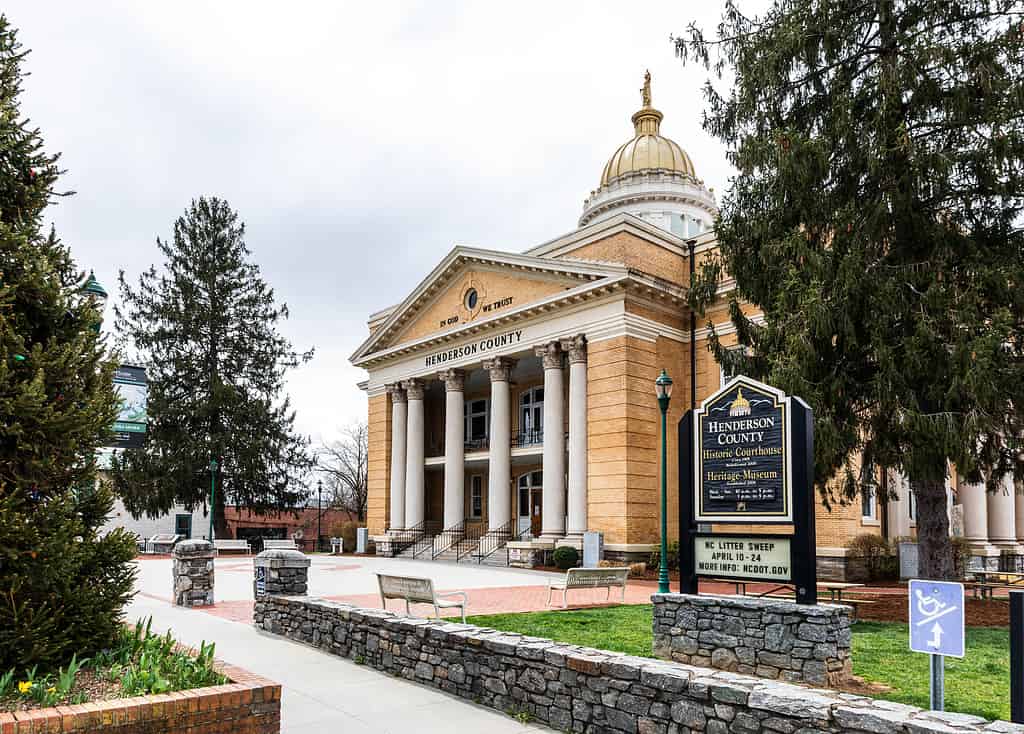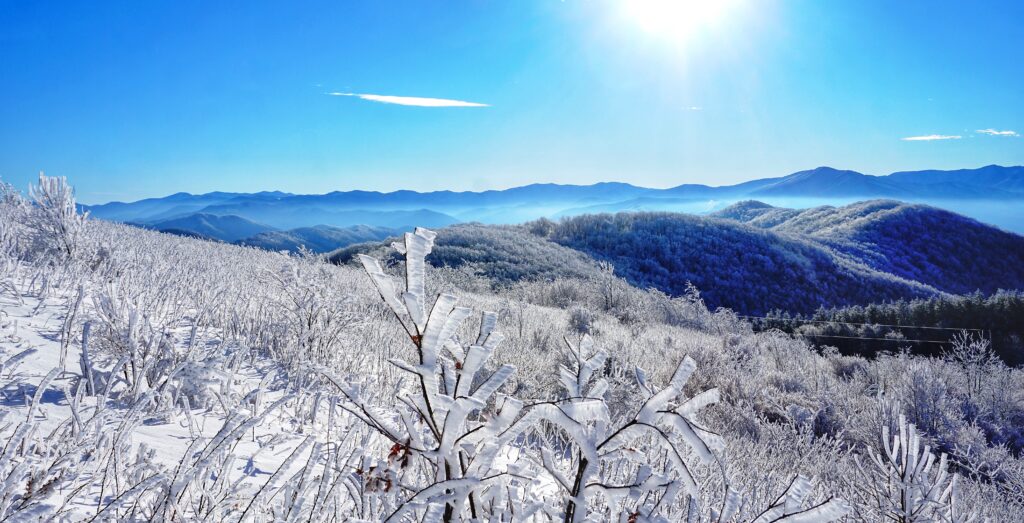You may be familiar with tornadoes and hurricanes in the Tar Heel State, but what about earthquakes? Earthquakes not only cause the ground to shake, but they can also result in landslides, avalanches, rockslides, and tsunamis. Nearly 500,000 earthquakes occur annually in the United States, with the “Ring of Fire” around Hawaii being a hot zone. And most happen along faults at the plate boundaries. Thankfully, there are no active fault zones in North Carolina. But small and random quakes can happen. Discover the North Carolina town most likely to experience an earthquake, including how common they are in the state.
Which City is Most Prone to Earthquakes in North Carolina?

What’s the North Carolina town most likely to experience an earthquake? Hendersonville.
©Nolichuckyjake/Shutterstock.com
Hendersonville is the North Carolina town most likely to experience an earthquake. According to the Earthquake Risk Index Score, Hendersonville has a higher relative risk for earthquakes than the rest of the state.
Hendersonville has an earthquake index of 3.23, compared to the 0.18 score North Carolina possesses as a whole. The United States has an index score of 1.81, so Hendersonville has a higher-than-average risk of experiencing an earthquake. But it also has a lower-than-average chance of seeing a tornado.
About Hendersonville, North Carolina
Hendersonville is 22 miles south of Asheville in Western North Carolina. It is known as the “City of 4 Seasons” and is a popular place for North Carolinians to go apple picking, visit a mountain brewery, or stroll along the downtown art and culinary scene. Located in the majestic Blue Ridge Mountains, Hendersonville was incorporated in 1847 after wealthy low-country planters moved to the area. Today the area features a quaint yet bustling downtown and over 15,000 residents.
How Bad Are the Earthquakes in Hendersonville, NC?

Hendersonville has had dozens of earthquakes within the last 90 years.
©Inked Pixels/Shutterstock.com
Even though you are more likely to experience an earthquake in Hendersonville compared to the rest of the state, the chance of one actually happening is still relatively low. The area has experienced around a dozen quakes within the last 90 years. And two had recorded magnitudes of 3.5 or above.
The most recent earthquake in Hendersonville transpired in December of 2022. The 2.7 magnitude quake struck the town and was even felt in Asheville. Residents felt rumbling late at night, but no significant damage was reported.
What Fault Line is Near Hendersonville, NC?
The closest fault line to Hendersonville, North Carolina, is the inactive Brevard Fault Zone. It’s over 400 miles long and extends through Virginia, North Carolina, Georgia, and Alabama. This fault played a major role in uplifting the Appalachian Mountains. Most of North Carolina’s earthquakes happen along the Brevard Fault. Thankfully, large, damaging quakes in the state are infrequent. But North Carolina can also feel large quakes from nearby states.
Where Do Most Earthquakes Occur in North Carolina? Where Are the Worst?

The Brevard Fault runs through Western North Carolina in the mountains.
©Yiwenz/Shutterstock.com
There are no active faults in North Carolina, but the inactive Brevard Fault Line still runs through a portion of the state. Most earthquakes in the state occur near that fault line in Western North Carolina. But the quakes in the state are relatively small and scattered, nothing like what California experiences.
The worst, most damaging earthquakes occurred in Wilkesboro (1861), Asheville (1916), Mitchell County (1926), and Henderson County (1981). All of these areas are in the western part of the state.
Are Earthquakes Common in North Carolina?
Seismic events are relatively common in North Carolina. However, the East Coast is not a seismically active area like the West Coast. Most of the earthquakes in North Carolina are not felt or noticed by people. And the ones that are felt tend to be mild and don’t generally cause any damage. Even the biggest quakes in the state don’t get above a three or a five. And most significant quakes are a six or higher. The highest recorded earthquake in the last 100 years in NC was 5.2.
Wildlife Around Hendersonville and How Earthquakes Impact Them
Due to its mountain location, there is abundant wildlife around the town of Hendersonville. The Blue Ridge Mountains contain over 50 mammal species, hundreds of birds, and dozens of reptiles and amphibians.
Here are some animals you may find:
- Black bears
- Red wolves
- Elk
- Peregrine falcons
- Bobcats
- Wild turkeys
- Beavers
- Turtles
Earthquakes can have devastating effects on wildlife, especially when they are catastrophic. Land ecosystems can be permanently altered, displacing many animals from their homes. Landslides and mudslides can collide with animals, too. But small earthquakes don’t do much harm other than causing some species to become alarmed.
Where is Hendersonville Located on a Map?
Located south of Asheville, North Carolina, Hendersonville is a vibrant city with a diverse range of attractions. The downtown area is home to the Henderson County Heritage Museum, which displays fascinating Civil War artifacts and features a replica of a 1900s general store.
Here is Hendersonville on a map:
Thank you for reading! Have some feedback for us? Contact the AZ Animals editorial team.








